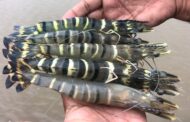New Delhi. 15 July 2022: It is crucial to have an integrated value chain in fisheries of activities when organising fish farmers, especially those who are poor, said Mr NN Sinha, Secretary, Ministry of Rural Development, Government of India, at the First Conference on Fishtech, organised by the industry chamber FICCI.
Delivering the Special address, Mr Sinha alluded to the need to develop an integrated structure akin to the dairy sector. “There is a lot of scope for developing such a value chain”, he said. The secretary also referred to growing seaweed, ornamental fishing, and cage culture as viable livelihood activities. “We think aquaculture is an important livelihood option for a large number of people”, he said, adding, “we will work with everyone in the sector”.
Speaking on occasion, Mr Hemendra Mathur, Chairman, FICCI– Taskforce on Agri-Startups, said, “we need a dedicated fund for fishery startups, which can put in early-stage funding for startups trying to build interesting models and features”. Further, Mr Mathur said that “we should at least have 500 fishtech startups in the country, given the sector’s potential”, adding, “all startups put together account for less than 2-3 per cent of the market potential”.
He said that fishery is an important sector with more than 1.5 crore fishermen engaged in the activity and its contribution to GDP being more than USD30 billion. Noting the considerable headroom for growth, Mr Mathur alluded to the need to develop an innovation ecosystem in fishtech on the lines of agriculture and said, over the last five to seven years; we saw 1500-plus agri-tech startups in the country due to ecosystem development. However, he said the share of fishtech startups is still tiny, probably 30 to 50. “That is a small number in the context of the opportunity ahead of us”, he said, adding, “I think fishtech has a lot to catch up to when compared to agritech”.
Alluding to the opportunities in the sector, Mathur noted the need to create an integrated value chain and incorporate technology to bring efficiency to fisheries.
Mr Shashi Kant Singh, Executive Director, Agri & Natural Resources, PWC, also noted the potential of increasing the use of technology and, further, the headroom available to increase the production, exports and domestic consumption in the fishery sector. He added that a lot of “policy support”, “ecosystem support”, and “well-designed schemes” were introduced by the government during the last four to five years. However, “we do see a lot of opportunity for the fishery sector in improving the quality of the produce”, he said. Mr Singh added that “if the blue economy story has to be a success in India, then fishery is going to be one of the key segments, among others”.
Ms Devleena Bhattacharjee, Chair, FICCI Committee on Fishtech and Founder & CEO, Numer8 Analytics, said, “India is the second largest fish producing country in the world and contributes to about 7.56% of the global fish production. She noted that the fishery sector is a sunrise sector owing to tremendous scope in domestic consumption and expansion, strong export potential and greater economic returns with strong policy support.
A FICCI PwC report, “Championing the blue economy: Promoting sustainable growth of fisheries sector in India”, was released on occasion. The report showcases the potential of India’s fisheries sector, trends, opportunities, challenges, and strategic interventions needed to support the blue economy in India and build a sustainable and profitable future for the industry.
(Please share your experience, interesting news articles and case studies at aquapostnews@gmail.com)





